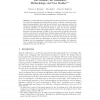Free Online Productivity Tools
i2Speak
i2Symbol
i2OCR
iTex2Img
iWeb2Print
iWeb2Shot
i2Type
iPdf2Split
iPdf2Merge
i2Bopomofo
i2Arabic
i2Style
i2Image
i2PDF
iLatex2Rtf
Sci2ools
130
click to vote
CAV
1998
Springer
1998
Springer
You Assume, We Guarantee: Methodology and Case Studies
Assume-guarantee reasoning has long been advertised as an important method for decomposing proof obligations in system veri cation. Re nement mappings (homomorphisms) have long been advertised as an important method for solving the language-inclusion problem in practice. When confronted with large veri cation problems, we therefore attempted to make use of both techniques. We soon found that rather than o ering instant solutions, the success of assumee reasoning depends critically on the construction of suitable abstraction modules, and the success of re nement checking depends critically on the construcsuitable witness modules. Moreover, as abstractions need to be witnessed, esses abstracted, the process must be iterated. We present here the main lessons we learned from our experiments, in form of a systematic and structured discipline for the compositional veri cation of reactive modules. An infrastructure to support this discipline, and automate parts of the veri cation, has been im...
Related Content
| Added | 05 Aug 2010 |
| Updated | 05 Aug 2010 |
| Type | Conference |
| Year | 1998 |
| Where | CAV |
| Authors | Thomas A. Henzinger, Shaz Qadeer, Sriram K. Rajamani |
Comments (0)

